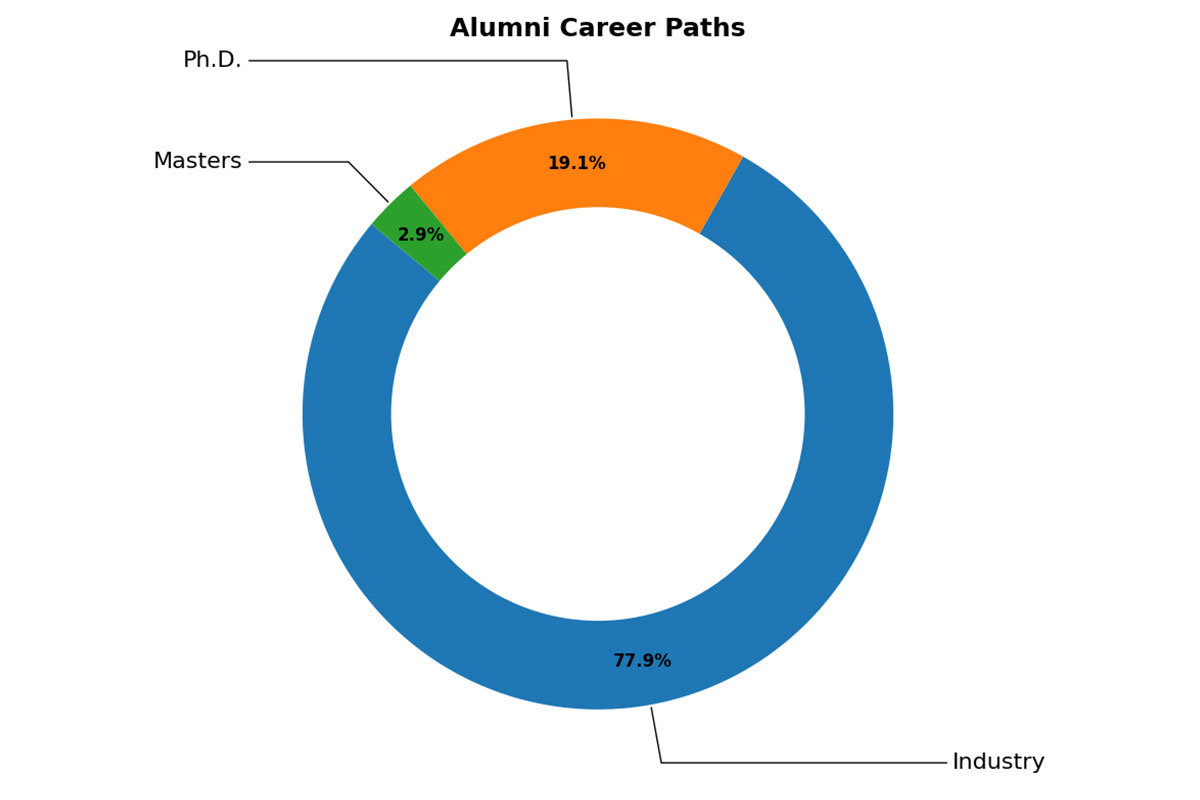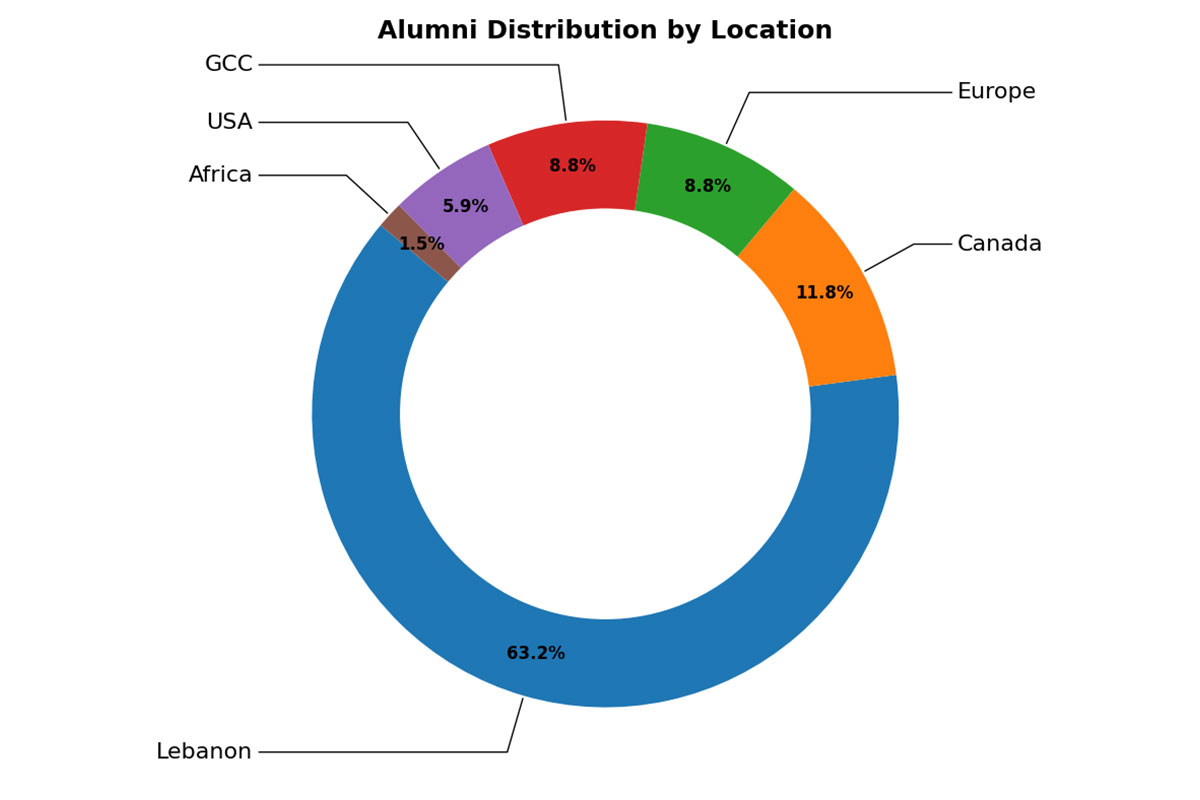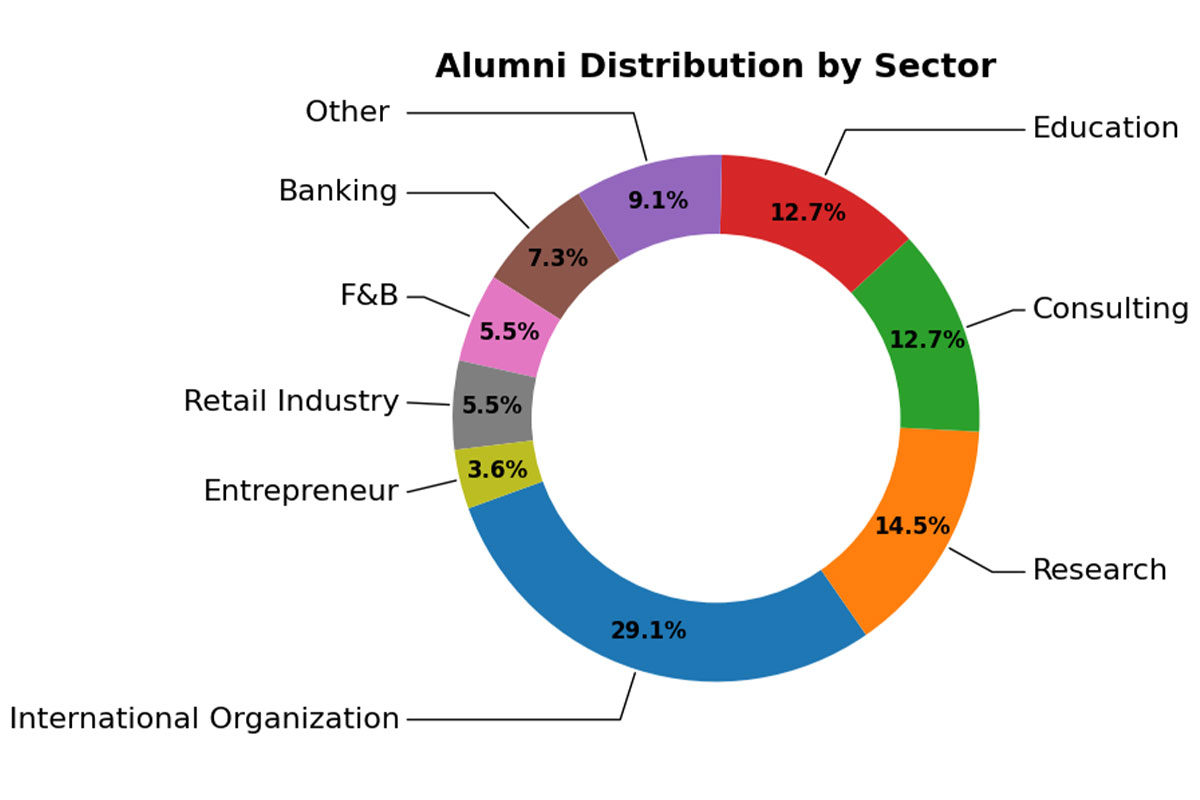Master of Arts (MA) in Applied Economics
Location: LAU Beirut
Delivery Mode: On-campus
Duration: two years (full-time)
Start term: Fall or Spring
Total Credits: 30
Department: Economics
The research- intensive MA in Applied Economics at LAU equips students with advanced economic theory and empirical techniques to tackle challenges faced by businesses and governments.
Program Overview
The MA in Applied Economics program is unique for its applied nature, providing students with strong economic and quantitative tools to analyze economic issues and problems. Since its inception in 2014, the program has grown rapidly, with more than 90 alumni. The program’s curriculum emphasizes data analysis and policy formulation, preparing graduates with the applied economics skills they need for impactful careers in both the public and private sectors.
The program is also designed to serve as a stepping stone toward a Ph.D. in Economics or related fields. This is evidenced by the success of 13 graduates who gained admission to prestigious Ph.D. programs at universities like HEC Montreal, University of Ottawa, Concordia University, and the University of Manchester. In terms of career placements, many of our graduates have found opportunities in the private sector and international organizations such as UN-ESCWA, UNDP, and the World Bank.
One noteworthy achievement is the significant number of joint publications authored by MA in Applied Economics students and faculty members, resulting in 32 peer-reviewed articles published in Q1 and Q2 journals.
Admission
Admission to the graduate programs offered at the Adnan Kassar School of Business follow the LAU general graduate requirements.
In addition to the following:
Applicants with a Bachelor’s degree in Economics or in other majors with a minor in Economics: No remedial courses are required.
Applicants with a Bachelor’s degree in Business, Mathematics, Engineering, Technology, or Computer Science: Required to complete 9–12 credits of remedial courses during the first year of enrollment.
A minimum GPA of 3.0 is required.
Program Requirements
The program consists of 30 credits with core courses emphasizing advanced microeconomics, macroeconomics, econometrics and quantitative methods. A selection of diverse topics totaling 9 credits constitute the elective component. The topic courses survey current policy issues in local, regional and international contexts.
To obtain the MA degree, students should complete a total of 30 credits composed of:
- Core Requirements (18 credits)
- Elective Requirements (9 credits)
- Capstone Project (3 credits)
The Applied Economics Project course is a research project written under the supervision of a faculty member. Students are required to use economic models and tools to tackle an applied economics problem. Students are then required to present their work in a forum open for economics faculty and graduate students.
Core Requirements (18 credits)
| Number | Course | Cr. |
| ECO821 | Advanced Microeconomics | 3 |
| ECO822 | Advanced Macroeconomics | 3 |
| ECO831 | Applied Econometrics I: Cross Section and Panel Data | 3 |
| ECO832 | Applied Econometrics II: Time Series Data | 3 |
| ECO833 | Applied Econometrics III: Empirical Strategies for Applied Microeconomics | 3 |
| ECO840 | Mathematical and Computational Models in Applied Economics | 3 |
Electives (9 credits with minimum 6 credits in economics)
| Number | Course | Cr. |
| ECO835 | International Monetary Theory and Policy | 3 |
| ECO850 | Environmental and Resource Economics | 3 |
| ECO852 | Public Economics | 3 |
| ECO855 | Growth, Business Cycles and Economic Policy | 3 |
| ECO861 | Economic Policies in the Middle East | 3 |
| ECO863 | Challenges of Economic Development in the Middle East | 3 |
| ECO880 | Special Topics in Economics | 3 |
| Non-economics Electives | ||
| FIN835 | Commercial Bank Management | 3 |
| FIN863 | Financial Derivatives | 3 |
| FIN836 | Modern Portfolio Management | 3 |
| OPM880C | Sp.Top.OPM: Operations Management | 3 |
| ACM724 | Linear Programming | 3 |
| CSC615 | Machine Learning | 3 |
| CSC688C | Top.CSC: Data Visualization | 3 |
| IGS725 | Gender and Public Policy | 3 |
| INA831 | Intl. Political Economy | 3 |
| MIG765 | Migration and Development | 3 |
MA Project (3 credits)
| Number | Course | Cr. |
| ECO898 | Applied Economics Project | 3 |
Program Goals and Outcomes
The MA in Applied Economics program places a significant emphasis on research experience, preparing our students to understand and analyze complex economic theories but also to apply these theories in a practical research setting.
Comprehensive econometrics training is a crucial part of the program. With three specialized econometrics courses, our students are equipped with robust quantitative skills, enabling them to model, forecast, and analyze economic and social phenomena. Throughout these econometric courses, students learn how to use the appropriate tools (i.e. Stata) needed to analyze datasets, perform statistical analyses, and make evidence-based economic decisions.
The real-world application of skills is integral to our approach. Students are encouraged to delve into various research projects, applying economic theories and econometrics skills throughout their studies. These projects span a variety of economic issues, enabling students to broaden their understanding and find their unique research interests.
To graduate, students must complete a Research Project under the supervision and mentorship of experienced faculty, allowing them to apply their accumulated knowledge and skills to craft and address a unique research question. Students undertake the complete process of conducting research, from formulating a research question to presenting findings in a structured academic paper, with some students managing to publish academic research papers in reputable peer-reviewed journals.
This focus on practical research experience equips our students with a deep understanding of applied economics and provides a solid foundation driving their success in a Ph.D. program and their professional careers. Upon graduation, our students are adept at handling complex data, conducting rigorous research, and interpreting and presenting their findings – skills that are highly sought after in academia, government, industry, and non-profit organizations.
The combination of comprehensive econometric training and real-world research experiences shapes our students into accomplished researchers. They graduate with a portfolio of research projects demonstrating their ability to contribute innovative insights to the field of economics. Whether they proceed into a Ph.D. program or a professional role, our graduates are equipped to drive economic research and policymaking, contributing to real-world decisions.
Upon completion of the MA in Applied Economics the graduate will:
- Possess advanced knowledge in the areas of microeconomics, macroeconomics and econometrics.
- Be capable of using economic theory and econometric models for assessing public policies.
- Understand and work with advanced macroec
- echniques to analyze economic data.
- Interpret and critically evaluate articles in the economics research literature.
- Use advanced economic theory and empirical methods to evaluate public policy decisions.
- Critically analyze government economic policies.
- onomic and microeconomic models.
- Apply advanced mathematical and econometric techniques to analyze economic data.
- Interpret and critically evaluate articles in the economics research literature.
- Use advanced economic theory and empirical methods to evaluate public policy decisions.
- Critically analyze government economic policies.
Courses
ECO821 Advanced Microeconomics [3-0, 3 cr.]
This is an introductory graduate course in microeconomic theory. Topics cover consumption theory, including choice under uncertainty, production theory, partial equilibrium, and general equilibrium in perfectly competitive markets. The course also includes a treatment of game theory. The covered material will equip students with essential microeconomic tools needed for further coursework.
ECO822 Advanced Macroeconomics [3-0, 3 cr.]
The course will cover advanced models of short-run economic fluctuations and long-term economic growth in modern economies. Elements of fiscal and monetary policies will also be discussed.
ECO831 Applied Econometrics I: Cross Section and Panel Data [3-0, 3 cr.]
This course provides students with an advanced understanding of the principles of the econometric techniques for analyzing cross-section and panel data. Topics covered include multiple regressions model, instrumental variables, discrete choice models, limited dependent variable models, and panel data methods. Emphasis will be placed on examples in applied microeconomics fields to tackle a number of current economic issues whereby students learn how to conduct empirical research.
ECO832 Applied Econometrics II: Time Series Data [3-0, 3 cr.]
The aim of this course is to introduce students to a comprehensive theoretical framework of time series econometrics and its applications. Topics covered include stationary univariate time series processes, non-stationary processes, multivariate processes, systems of simultaneous equations, and cointegration and error-correction models. The course involves frequent use of time series datasets with an emphasis on applications in the field of macroeconomics.
Prerequisites: ECO831
ECO833 Applied Econometrics III: Empirical Strategies for Applied Microeconomics [3-0, 3 cr.]
This course examines empirical strategies used in applied microeconomics with an emphasis on identification and causality. Topics include randomized trials, regression, instrumental variables, regression discontinuity designs, differences-in-differences and matching. Special emphasis will be put on real-world policy evaluation.
Prerequisites: ECO831 and ECO 832
ECO840 Mathematical and Computational Models in Applied Economics [3-0, 3 cr.]
The course will introduce mathematical and computational modeling problems of applied economics. The course will cover optimization and dynamic models. The course will include implementation of the models in computer algebra systems GAMS and MATHEMATICA.
ECO835 International Monetary Theory and Policy [3-0, 3 cr.]
The course will study monetary policy models that are at the forefront of theoretical and empirical research in addition to those utilized by central banks to evaluate policies and various exchange rate arrangements. The relationship between policies and economic outcomes such as unemployment, inflation, stabilization and growth will be investigated in an open-macroeconomic setting.
Prerequisite: ECO822
ECO850 Environmental and Resource Economics [3-0, 3 cr.]
This course provides a treatment of fundamental issues in the economic approach to resource and environmental problems management. Topics covered include the economy-environment linkage, sustainable development, the theory of public goods and externalities, environmental pollution targets and instruments, and renewable and non-renewable natural resource exploitation.
Prerequisite: Advanced Microeconomics ECO 821
ECO852 Public Economics [3-0, 3 cr.]
This course is a microeconomic examination of the economic role of government. The course covers theory and evidence on government expenditure and taxation policy. In the expenditure component, we examine the theories of public goods, externalities and social insurance, and applications of these theories in various sectors such as education, welfare programs, and health care. In the taxation component, topics include: tax incidence, optimal tax theory, and the effect of taxation on labor markets and corporate behavior.
Prerequisites: ECO821
ECO855 Growth, Business Cycles and Economic Policy [3-0, 3 cr.]
This course will study the interplay between economic policy, economic growth and business cycles in developed and developing economies. Fiscal policies aimed at stabilization and growth will be introduced from theoretical and empirical perspectives. The role of economic policy in engendering economic growth and development in developing countries will also be studied utilizing traditional and structural macroeconomic models. Examples from Great Depression, Great Recession, postwar capitalist development and developing countries experiences will be introduced.
Prerequisites: ECO822
ECO861 Economic Policies in the Middle East [3-0, 3 cr.]
The first part of the course studies the macroeconomic situation in the MENA region. An overview of fiscal and monetary policies, in addition to the choice of exchange rate regimes, is conducted. The second part of the course studies public economics and policies in Middle East countries. The course investigates the provision of public goods, social security systems, health provision, and tax structures. The issues of efficiency and equity are given prime importance.
ECO863 Challenges of Economic Development in the Middle East [3-0, 3 cr.]
This course discusses current economic issues in the Middle East. Applying economic theory together with the institutional framework in the MENA region, important problems and challenges are analysed. Under experienced supervision, students analyse specific economic issues and present potential theoretical explanations and policy recommendations. The analysis is based on theoretical and empirical methods commonly used in economics, taking into account the relevant institutional framework in the economies under investigation.
ECO880 Special Topics in Economics [3 cr.]
This course deals with selected topics in economics.
Prerequisite varies according to topic offered. This course may be repeated for credit when topics vary.
ECO898 Applied Economics Project [3-0, 3 cr.]
The course is a research project written under the supervision of a faculty member. Students are required to use economic models and tools to tackle an applied economics problem. Students are then required to present their work in a forum open for economics faculty and graduate students. The project may involve work outside LAU with external constituents (e.g., research institutes, specialized regional and international agencies, banks, or government entities).
Prerequisite: Consent of Department
FIN863 Financial Derivatives [3-0, 3 cr.]
This course deals with derivative securities. It focuses on the analysis of options, futures, option and futures’ markets, and option and futures’ strategies. In addition, it discusses option and futures’ pricing models, and how derivatives are used in financial risk management.
FIN836 Modern Portfolio Management [3-0, 3 cr.]
This course applies concepts of efficient capital markets, modern portfolio theory, and asset pricing models to practical problems of security analysis, portfolio construction, optimization, and performance measurement. The analysis considers return and risk characteristics of various financial investment instruments and derivatives, including common stocks, bonds, futures, options, and forward contracts. [3-0,3cr.].
FIN835 Commercial Bank Management [3-0, 3 cr.]
This course covers commercial bank management policies and decisions. Analysis includes advanced treatment of asset-liability management, emphasizing risk management issues such as interest rates, liquidity, credit, capital, and off-balance sheet risk and activities. The analysis presents financial engineering techniques in risk management and evaluates bank performance.
OPM880C: Sp.Top.OPM: Operations Mgt. [3-0, 3 cr.]
This course is designed to introduce you to concepts and techniques related to the design, planning, control, and improvement of manufacturing & service operations. The course initially presents a holistic view of operations. It focuses on operational strategy and productivity, management of product and process design, Quality, and supply chain management. As the course progresses, we will investigate various aspects of each of these topics in detail. We will cover topics in the areas of process analysis, materials management, production scheduling, quality improvement, and product design.
ACM724: Linear Programming [3-0, 3 cr.]
Topics covered are: Simplex method, degeneracy, cycling, fundamental theorem of linear programming, weak and strong duality theorems, dual simplex method, resource allocation, sensitivity analysis, simplex method in matrix notation, parametric analysis, and applications.
CSC615: Machine Learning [3-0, 3 cr.]
This course provides an overview of popular algorithms in machine learning. Topics include supervised learning, linear and polynomial regression, classification algorithms, gradient descent, unsupervised learning, instance-based learning, neural networks, and genetic algorithms and boosting. The course requires some knowledge of artificial intelligence, and good programming skills. The theoretical aspects of the algorithms will be studied, and assignments will be given to test their applicability.
CSC688C: Top.CSC:Data Visualization [3-0, 3 cr.]
This course covers the essential and practical skills necessary to communicate information about data clearly and effectively through graphical means based on principles from graphic design, visual art, perceptual psychology, and cognitive science. The course introduces the value of visualization, the principles and techniques of data visualization, and specific techniques in information and scientific visualization. The course also focuses on big data organization and mining for decision support, and how to best leverage visualization methods. The assignments will involve the use of Tableau, web programming using D3, statistics, and the ability to manipulate data sets with code.
IGS725: Gender and Public Policy [3-0, 3 cr.]
Introduction to decision-making processes and current and contemporary legal and social debates over public policy directly affecting women in major spheres of public life in the Arab world, with a focus on the Lebanese and Arab contexts (e.g., citizenship, political participation, foreign domestic workers, etc.). Topics may focus on public health, political participation, employment policies and practices, etc.
INA831: Intl. Political Economy [3-0, 3 cr.]
The seminar examines the basis of the international political economy and analyzes interactions between economic and political factors on the international levels. Discussion issues include; international finance, international trade and the role of governmental and non-governmental international organizations.
MIG765: Migration and Development [3-0, 3 cr.]
This seminar examines the most relevant issues concerning the relationship between migration and development. The complex dynamics that characterize the interconnection between migration and development including socio-political (state-, society- and household- related), economic (labor-, income- and capital-related), and legal (human rights, international and regional policy) factors will be reviewed. The courses acknowledges that, in both sending and receiving countries, different patterns of migration – circular, return, temporary, permanent, regular/irregular – may have different impacts on development. Push factors (underemployment and unemployment; poverty; poor access to welfare; low rewards to skills; poor governance, political or civil instability, etc.), and pull factors (jobs availability; higher incomes; social security; higher education; networks of previous migrants; etc.) will also be examined. Debates on the impact of development include destination and origin countries.
Typical Study Plan
Fall I (9 credits)
- ECO821 Advanced Microeconomics (3 cr.)
- ECO840 Mathematical and Computational Models in Applied Economics (3 cr.)
- ECO831 Applied Econometrics I: Cross Section and Panel Data (3 cr.)
Spring I (9 credits)
- ECO822 Advanced Macroeconomics (3 cr.)
- Applied Econometrics II: Time Series Data (3 cr.)
- Program Elective I (3 cr.)
Fall II (9 credits)
- ECO833 Applied Econometrics III: Empirical Strategies for Applied Microeconomics (3 cr.)
- Program Elective II (3 cr.)
- Program Elective III (3 cr.)
Spring II (3 credits)
- ECO898 Applied Economics Project
| Core Requirements | 18 |
| Electives | 9 |
| MA Project | 3 |
| Total | 30 |
Student Research Awards
MA Applied Economics students have proudly earned LAU Student Research Awards for five consecutive academic years.
Academic Year 2024-2025:
LAU Alumni Outstanding Research Award
- Vanessa Antoine Kajjouni, MA in Applied Economics
Best Presentation Award
- Lyne Elias Azar, MA in Applied Economics
Best Poster Award
- Hadi Jihad Moursel, BS in Economics
- Raneem El Salem, BS in Economics
- Chloé Harb, BS in Economics
Academic Year 2023-2024:
LAU Student Outstanding Research Award
- Zein Alameh, MA in Applied Economics
Best Oral Presentation Award in the field of Business and Economics
- Vanessa Antoine Kajjouni, MA in Applied Economics
- Dareen Youssef Fayyad, MA in Applied Economics
Academic Year 2022-2023:
- Sara Kassab, MA in Applied Economics
- Zeina Lizzaik, MA in Applied Economics
Best Oral Presentation Award in the field of Business and Economics
- Ibrahim Al Soussy, MA in Applied Economics
- Michael Ibrahim Fheili, MA in Applied Economics
Academic Year 2021-2022:
- Pierre Boutros, MA in Applied Economics
Academic Year 2020-2021:
Issam Abdo Ahmad, MA in Applied Economics
Joint Publications with Faculty Members
One of the program’s key achievements is the publication of 35 peer-reviewed articles co-authored by MA in Applied Economics students and faculty, published in Q1 and Q2 journals.
- El-Baba, W., & Fakih, K. (2026). Non-universal social protection systems and labor market outcomes in unstable economies: The case of Lebanon. International Journal of Manpower,1-18.
- Awdeh, A., Fakih, A., & Tchelderian, V. (2026). Sovereign debt and financial sector nexus in the MENA region. International Journal of Islamic and Middle Eastern Finance and Management, 1-27.
- Karaki, M. B. & El Chaar, J. (2026). Fuel price shocks and inflation dynamics in Lebanon . Energy Economics, 153, 109029.
- Alamah, Z., Fakih, A. (2025). Is the Price of Ether Driven by Demand or Pure Speculation?, Computational Economics, 66, 323-347.
- Fakih, A., El Chaar, J., El Arissy, J., & Kassab, S. Z. (2025). Governance quality and the labor market in the MENA region post-Arab Spring. International Journal of Social Economics, 52(3), 422-439.
- Fakih, A., Fayyad, D., Debian, A., Neaimeh, A., & Zeaiter, H. (2025). What are the drivers of education attainment in the MENA region? African Development Review, 37(3), 1-23.
- Estephane, P. F., & Haidar, J. I. (2025). Legal origins, labor regulations, and labor market outcomes. Labor History, 1–36.
- Fheili, M. I., & Marrouch, W. (2025). Determinants of improper versus proper waste disposal practices by households: Evidence from greater Cairo’s urban slums, Cleaner Waste Systems, 12, 100410.
- Kajjouni, V. & Marrouch, W. (2025). Who uses solar water heaters? Evidence from the Palestinian Territories, Energy for Sustainable Development, 85, 101645
- Fakih, A., Sleiman, Y. (2024). The Gender Gap in Political Participation: Evidence from the MENA Region. Review of Political Economy, 36(1), 154-177.
- Fakih, A., Kassab, S., & Lizzaik, Z. (2024). Employability of Syrian refugees in Lebanon: the role of legal residency. Defence and Peace Economics, 35(8), 1028-1045.
- Karaki, M. B., & Neaimeh, A. (2024). Do higher global oil and wheat prices matter for the wheat flour price in Lebanon?. Agricultural Economics.
- Alamah, Z., Elgammal, W., & Fakih, A. (2024). Does twitter economic uncertainty matter for wheat prices?. Economics Letters, 234, 1-6.
- Kassab, S. (2024). The Impact of Remittance Inflows on Inflation: The Case of Lebanon. Review of Middle East Economics and Finance, 20(1), 113-127.
- Diab, A., & Fakih, A. (2024). Determinants of Happiness Among Arab Youth: Evidence from a Youth Survey. SAGE Open, 14(1), 1-13.
- Ahmad, I. A., Fakih, A., & Hammoud, M. (2023). Parents’ perceptions of their children’s mental health during COVID-19: Evidence from Canada. Social Science & Medicine, 337, 11629.
- Karaki, M. B., & Safieddine, H. (2023). Do defense news crowd out private investment?. Economics Letters, 111421.
- Diab, S., & Karaki, M. B. (2023). Do increases in gasoline prices cause higher food prices?. Energy Economics, 107066.
- Baltaji, R., Fakih, A., & Sayour, N. (2023). How did COVID lockdowns affect firms and workers? Evidence from Jordan and Morocco. Development Policy Review, 41(6), 1-23.
- Boutros, P., Fakih, A. (2023). The Disability Employment Paradox in Developing Countries: Recent Evidence from Lebanon, Development Studies Research, 10(1), 1-16.
- El Baba, W., & Fakih, A. (2023). COVID‐19 and consumer behavior: Food stockpiling in the US market. Agribusiness, 39(2), 515-534.
- Boutros, P., Fakih, A., & Tarraf, M. (2023). Adapting to the New Normal: The Impact of Remote Work on Firm Performance in Jordan and Morocco. Regional Science Policy & Practice, 15(8), 1722-1740.
- Fakhoury, A., Fakih, A. (2023). Government Intervention and Business Response as Determinants of Business Continuity amid COVID-19: The Case of Jordan and Morocco. International Journal of Economic Policy in Emerging Economies, 17(2), 196-219.
- Fakih, A., & El Baba, M. (2023). The willingness to emigrate in six MENA countries: The role of post‐revolutionary stress. International Migration, 61(4), 201-220.
- Hashem, I., & Marrouch, W. (2023). Polluting resource extraction and climate risk. Natural Resource Modeling, 36(1), 1-9.
- Alamah, Z., AlSoussy, I., & Fakih, A. (2023). The Role of International Research Collaboration and Faculty Related Factors in Publication Citations: Evidence from Lebanon. Economies, 11(3), 90.
- Bouri, E., Hammoud, R., & Kassm, C. A. (2023). The effect of oil implied volatility and geopolitical risk on GCC stock sectors under various market conditions. Energy Economics, 120, 106617.
- Fakih, A., & Khayat, R. (2022). Social identity, confidence in institutions, and youth: Evidence from the Arab Spring. Social Science Quarterly, 103(5), 997-1018.
- Baki, G. A., & Marrouch, W. (2022). Environmental taxation in the Bertrand differentiated duopoly: New insights. Resource and Energy Economics, 70, 101329.
- Boutros, P., Fakih, A., Kassab, S., & Lizzaik, Z. (2022). Does the Number of Publications Matter for Academic Promotion in Higher Education? Evidence from Lebanon. Social Sciences, 11(10), 454.
- Al Gharib, F., & Marrouch, W. (2022). Central air conditioning, air pollution and housing location: evidence from Lebanon. International Journal of Housing Markets and Analysis, 16(5), 979-990.
- Boutros, P., Fakih, A. (2022). Drivers of Research Outcomes in Developing Countries: The Case of Lebanon. Economies, 10(3), 58.
- Fakih, A., Haimoun, N., Sleiman, A. (2022) What Drives Demand for Private Tutoring in the MENA Region? Evidence from a Youth Survey. African Development Review, 34(2), 268-279.
- Abdo A., I., Fakih, A. (2022) Does the Legal Form Matter for Firm Performance in the MENA Region? Annals of Public and Cooperative Economics, 93(1), 205-227.
- Barakat, Z., Fakih, A. (2021) Determinants of the Arab Spring Protests in Tunisia, Egypt and Libya: What have we learned? Social Sciences, 10(8), 282.
- Baalbaki, R., Marrouch, W. (2020). Is there a garbage Kuznets curve? Evidence from OECD countries. Economics Bulletin, 40(2), 1049-1055.
- Fakih, A., Ghazzawi, N., Ghazalian, P. (2020) The Effects of Power Outages on the Performance of Manufacturing Firms in the MENA Region. Review of Middle East Economics and Finance, 16(3), 1-28.
- Marrouch, W., Mourad, J. (2019). Effect of gasoline prices on car fuel efficiency: Evidence from Lebanon. Energy Policy, 135, 111001.
Alumni Statistics
Alumni Placements
Many of our Applied Economics graduates got admitted into top-ranked Ph.D. programs, and secured employment opportunities in international organizations, consulting firms, NGOs and multinational corporations.
Ph.D. Placement
- HEC Montréal, Ph.D. in Applied Economics
- ICN Business School, PhD in Accounting and Finance
- University of Ottawa, Ph.D. in Economics
- Concordia University. Ph.D. in Economics
- University of Manchester, Ph.D. in Economics
- University of Houston, Texas, Ph.D. in Political Science
- University of Cyprus, Ph.D. in Economics
- Carleton University, Ph.D. in Economics
- University College London (UCL), Ph.D. in Political Science
Industry Placement
- United Nations Development Programme (UNDP)
- United Nations High Commissioner for Refugees (UNHCR)
- World Bank
- United Nations Economic and Social Commission for Western Asia (ESCWA)
- Institute of Global Prosperity – UCL
- Chevron Corporation, American multinational energy corporation
- Korn Ferry, Global organizational consulting firm
- League of Arab States
- American Near East Refugee Aid, NGO
- The Arab Council for Social Sciences, NGO
Testimonials

Farah Younes, Research and Executive Assistant, UNDP
Building on my background in mathematics, the M.A. in Applied Economics at LAU has provided me with a robust foundation in both theoretical and practical aspects of economics. The program’s diverse curriculum and emphasis on applied skills have been instrumental in enhancing my analytical abilities, preparing me for real-world challenges. Engaging with esteemed faculty and participating in research opportunities has not only expanded my knowledge but also helped shape my professional path, particularly in my current role at UNDP. The skills I gained during my studies, particularly in data analysis and economic research, have been invaluable to my career development. This program, and LAU, will always hold a special place in my heart for the profound knowledge and experiences it has offered.

Mohammad Bzeih, Ph.D. Candidate in Economics, City University of New York (CUNY)
Transitioning from a background in mathematics, I embarked on the M.A. in Economics program at LAU, which proved instrumental in facilitating my shift to economics. The program provides a valuable quantitative foundation, essential for both research and professional spheres. One pivotal component of the program is the diverse faculty. Their different backgrounds and interests help students acquire a prerequisite knowledge spanning different disciplines of political economy, environmental economics, and econometrics, thereby enriching students’ academic and professional development and preparing them for the next step.

Wafaa El Baba, Team Lead Economist, AI Economic Pulse
As an alumna of the M.A. in Applied Economics Program at LAU, I am proud to affirm that the program excels in preparing its students for a seamless school-to-work transition amid a fast-paced labor market characterized by high uncertainties and disruptions. The program’s knowledgeable and supportive faculty and well-tailored educational curriculum equipped me with the necessary expertise to launch my career as a research analyst at the United Nations. I am now embarking on a new chapter as a team lead economist at AI Economic Pulse startup. Engaging with the faculty in extracurricular research work elevated my research and analytical skills and helped me identify and refine my research interests for future career and educational opportunities. The program’s emphasis on its applied aspect proved invaluable in meeting the current demanded skills in the job market.
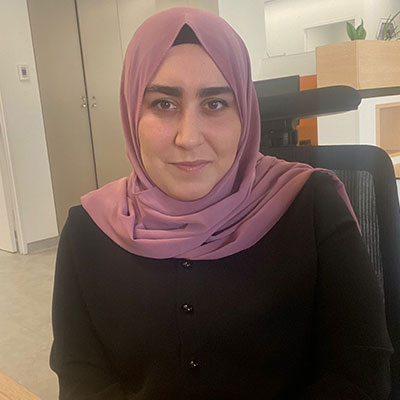
Sara Kassab, Research Analyst, UN-ESCWA
The M.A. in Applied Economics program at LAU has been a transformative journey that has enabled me to reach new heights in my career and life. The program’s consistent emphasis on practical applications has been exceptionally beneficial, equipping me with the proficiency to produce a research paper from inception, a skill I once thought was beyond my reach. The faculty members’ continuous assistance and support have been priceless. They have guided me to explore new horizons and grow both personally and professionally. As I begin my journey as a research analyst at the United Nations, I am filled with a strong sense of confidence and preparedness, knowing that this program has provided me with the necessary tools and knowledge to excel in my new position. I will be forever grateful for the opportunities and experiences this program has provided.

Zeina Lizzaik, Ph.D. Candidate in Economics, Concordia University
The M.A. in Applied Economics program at the Lebanese American University (LAU) has been an enriching experience that has facilitated both my academic and professional growth. Students enrolled in this program gain valuable experience in diverse economic areas and acquire a vast amount of knowledge through the program’s coursework, thanks to the supportive faculty. Furthermore, the program actively promotes research and professional growth through internships and research assistantships, among other opportunities. As I prepare to take the next step in my academic journey with a Ph.D. program, I am sincerely grateful for the knowledge and experiences gained through this exceptional program. I am confident that the strong foundation and expertise acquired will undoubtedly play a pivotal role in shaping my academic and research aspirations for the Ph.D. program and beyond.

Pierre Boutros, Ph.D. Candidate in Economics, University Côte d’Azur
Pierre Boutros is currently pursuing his Ph.D. in Economics at GREDEG, a research center associated with the University Côte d’Azur, and he is a consultant at the Lebanese Center for Lebanese Studies (LCPS). He received his master’s degree in Applied Economics from the Lebanese American University and Bachelor’s degree in Financial Engineering from La Sagesse University. He has been active in research and policy reports. His research areas include economics of science, labor economics, and applied economics. Pierre also contributed to the book “The Middle East and North Africa 2022”.

Yara Sleiman, PhD Candidate at the Department of Political Science, University College London
The M.A. in Applied Economics program was a challenging but rewarding experience that allowed me to grow academically and professionally. The coursework helped me advance my empirical research skills and learn how to effectively handle complex datasets in my research. This skill set has been instrumental in my pursuit of a doctoral degree and has set me up for success in my academic career. I was also fortunate to have had the opportunity to work with a dedicated and knowledgeable faculty who were always willing to provide guidance and support.
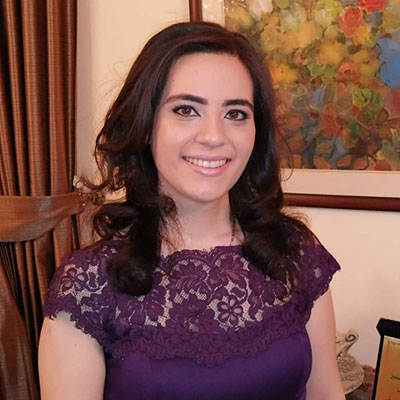
Ghina Abdul Baki, Ph.D. candidate in Economics, University of Ottawa
The Applied Economics Graduate Program at LAU offers a high educational quality that is vital for a future career or academic success. It also creates supportive and encouraging learning and research environment for students to step out of their comfort zone, and that is what defines an authentic education.

Giorgio Maarraoui, Ph.D. candidate in Economics, the University of Manchester
The M.A. in Applied Economics has greatly boosted my software skills (STATA, Mathematica, and GAMS) as an economist. Needless to say, knowledge of these skills is in high demand in the labor market in Lebanon and abroad. In addition, the program not only enriched me with the theoretical baggage needed for a Ph.D., but also allowed me to learn how to write referee reports, think about real-life economic problems strategically and methodically, and write economic papers from A to Z.

Ghida Matar, PhD candidate, ICN Business School
The MA in Applied Economics program at LAU provided a solid foundation for my research journey and has been instrumental in my success as a PhD candidate in Accounting and Finance at ICN Business School. Admission to this highly competitive PhD program (9 accepted out of 600+ applicants) required an impressive research proposal, strong econometric skills, and expertise in Stata—all honed during my MA. My three Q1 Scopus-indexed publications, developed with professors, further strengthened my application. The program’s high-quality instruction and practical insights enhanced my clarity on research methodology and have been pivotal in excelling during my demanding first-year PhD coursework. The guidance and knowledge gained during my MA have been invaluable in navigating the challenges of my PhD pursuit.

Hadi Safieddine, Business Performance Analyst, Elie Saab
The MA in Applied Economics at LAU sharpened my analytical and problem-solving skills. This has been important in shaping my approach to challenges in my current role as a Business Performance Analyst.

Hassan Bairam, Deputy General Manager, Samana for Business

Mira Al Khalili, PhD candidate, Universitat Rovira i Virgili (URV), in Spain (Reus)
Earning an MA in Applied Economics from LAU provided me with a strong foundation in research and analytical skills, opening the door to my PhD journey and shaping my academic career. Recently, I had the opportunity to present my research—part of my PhD thesis—at a conference in Reus, Spain, highlighting the impact of power supply on firm growth in the MENA region.
